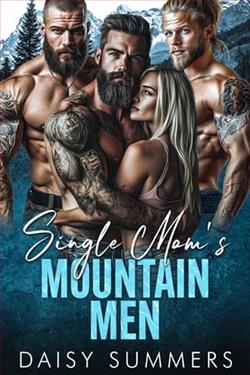Page 3 of Wild Wicked Scot
“Miss Armstrong.”
“Pardon? What?” she asked dreamily as someone touched her elbow.
Mr. Fitzgerald smiled. “Your butler,” he said, nodding at someone over her shoulder.
Margot forced her gaze away from Mr. Fitzgerald and around to Quint. “Yes?” she asked impatiently.
“Your father asks that you join him in the family dining room.”
Margot blinked. Of all the rotten timing!“Now?”she asked, endeavoring to sound angelic but hissing a bit.
“Shall I hold your champagne until you return?” Mr. Fitzgerald asked.
Margot hoped she didn’t look as ridiculously pleased as she felt. But still, she didn’t trust any number of the young women who were presently circulating about them like sharks. “Umm...” She looked pleadingly at Quint. “Perhaps Pappa might wait?”
But as usual, Quint returned her look impassively. “He asks that you attend him at once.”
“Do go on,” said Mr. Fitzgerald with a warm smile. “We shall have that dance when you return.” He took the flute from her hand and politely bowed his head.
“You are too kind, Mr. Fitzgerald. I shan’t be but a moment.” Margot whirled about, and with a glare for poor old Quint, she picked up her skirts and sailed out.
When she entered the family dining room, the smell of horse and men assaulted her, and Margot had to swallow her aversion to it. She was surprised to see her father seated with the rough-looking men who had arrived at Norwood Park earlier. Her brother Bryce was there, too, watching the five men as one might observe animals in the wild. Four of the men were devouring their food, sounding a bit like a pack of animals who had not eaten in quite a long time.
“Ah, there she is, my daughter, Margot,” her father said, standing and holding out his hand to her.
She reluctantly walked forward and took it, curtsying to him. Up close, she noticed the man with the ice-blue eyes bore the dirt and grime of what she guessed was several days on the road. He wore a dark, unkempt beard, and she wondered idly if perhaps he’d lost his razor. His gaze presumptuously raked over her, from the top of her coiffed hair—the paper birds seemed to interest him—to her face and bodice and down the length of her body.
Howrude. Margot narrowed her eyes on him, but her glower seemed to please him. His blue eyes sparked as he came slowly to his feet, towering almost a foot above her.
“Margot, may I introduce Chieftain Arran Mackenzie. Mackenzie, my only daughter, Miss Margot Armstrong.”
One corner of his mouth turned up. Did he not know that to stare so intently was impolite? Margot dipped another perfect curtsy and extended her hand. “How do you do, sir?”
“Verra well, Miss Armstrong.”
His voice had a deep, lilting brogue that was quite unexpected and tingled at the base of her skull.
“And how do you do?” he asked, taking her hand in his. It was huge, and his thumb felt calloused as he stroked it across her knuckles. Margot thought of Mr. Fitzgerald—with his long, slender and manicured fingers. Mr. Fitzgerald had the hands of an artist. This man had bear paws.
“I am well, thank you,” she said, and lightly pulled her hand away. She looked expectantly at her father. He seemed in no hurry to dismiss her now that he’d introduced her to these men. How long was she to remain here? She thought of Mr. Fitzgerald standing in the ballroom just now, with two flutes of French champagne in his hands. She could imagine any number of young ladies who were closing in around him, ready to cart him off like so many buzzards.
“Mackenzie is to receive a barony,” her father said. “He shall be Lord Mackenzie of Balhaire.”
Why on earth should she care about that? But Margot was ever the dutiful daughter and smiled at the man’s throat. “You must be pleased.”
The man tilted his head to one side to catch her eye before he responded. “Aye, that I am,” he said, and his gaze moved boldly to her mouth. “I verra much doubt you will understand just how pleased I am, Miss Armstrong.”
A strong shiver ran down Margot’s spine. Why did he look at her like that? He was so brazen, so unguarded! And her father, standing just there!
“Thank you, Margot,” her father said from somewhere near her—she wasn’t really sure where he was, as she couldn’t seem to tear her eyes away from this beast of a man just yet. “You may return to your friends.”
What was this? She felt like the prize county sheep, paraded in for viewing.Look at the fine wool on this one.It vexed her—there were times her father seemed to forget that she was not a bauble to be held up for admiration.
She stared steadily into those icy blue eyes and said, “It is a pleasure to have made your acquaintance.” It was not a pleasure at all—it was a nuisance—and she hoped the man could see it in her gaze. Well, if he couldn’t see it, his companions certainly could. They’d all stopped eating and were staring at her almost as if they’d never seen a woman before. Which, judging by their clothing and wretched table manners, was almost believable.
“Thank you, Miss Armstrong,” he said, that voice so deeply lilting that it felt like a feather stroking down her spine. “But the pleasure has been completely mine, aye?” He smiled.
Those words and that smile made Margot feel strangely warm and fluid. She hurried out, eager to be as far from those men as she could.















